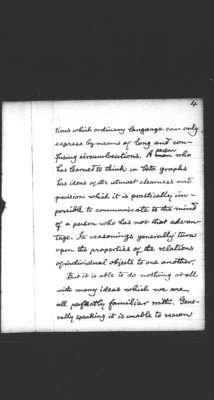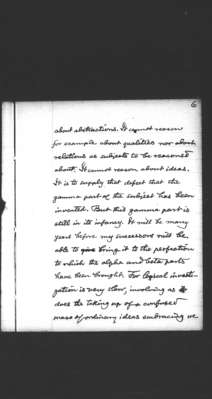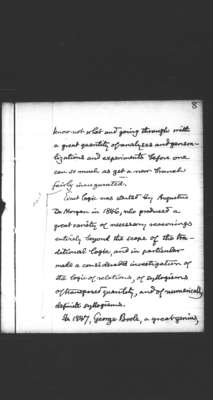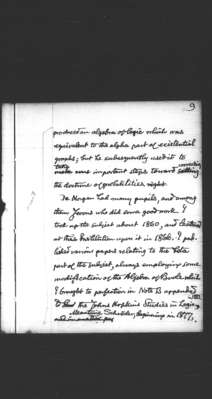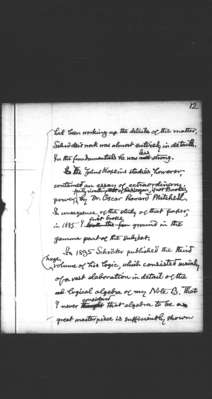Pages
36
4
which ordinary language can only express by means of long and confusing circumlocutions. A man person who has learned to think in beta graphs has ideas of the utmost clearness and precision which it is practically impossible to communicate to the mind of a person who has not that advantage. Its reasonings generally turn upon the properties of the relations of individual objects to one another.
But it is able to do nothing at all with many ideas which we are all perfectly familiar with. Generally speaking it is unable to reason
37
6
about abstractions. It cannot reason for example about qualities nor about relations as subjects to be reasoned about. It cannot reason about ideas. It is to supply that defect that the gamma part of the subject has been invented. But this gamma part is still in its infancy. It will be many years before my successors will be able to bring it to the perfection to which the alpha and beta parts have been brought. For logical investigation is very slow, involving as it does the taking up of a confused mass of ordinary ideas, embracing we
38
8
know not what and going through with a great quantity of analyses and generalizations and experiments before one can so much as get a new branch fairly inaugurated.
Exact logic was started by Augustus De Morgan in 1846, who produced a great variety of necessary reasonings entirely beyond the scope of the traditional logic, and in particular made a considerable investigation of the logic of relations, of syllogisms of transposed quantity, and of numerically definite syllogisms.
In 1847, George Boole, a great genius,
39
9
produced an algebra of logic which was equivalent to the alpha part of existential graphs; but he subsequently used it to take important steps toward correcting the doctrine of probabilities.
De Morgan had many pupils, and among them Jevons who did some good work. I took up the subject about 1860, and lectured at this Institution upon it in 1866. I published various papers relating to the beta part of the subject, always employing some modification of the Algebra of Boole which I brought to perfection in Note B appended to the Johns Hopkins Studies in Logic.
Meantime Schröder, beginning in 1877,
40
12
had been working up the details of the matter. Schröder's work was almost entirely in details. In the fundamentals he was not less strong.
The Johns Hopkins studies, however, contained an essay of extraordinary power, fairly rivalling that of De Morgan, if not Boole's, by Dr. Oscar Howard Mitchell. In consequence of the study of that paper, in 1885 I first broke ground in the gamma part of the subject.
In 1895 Schröder published the third huge volume of his logic, which consisted mainly of a vast elaboration in detail of the logical algebra of my Note B. That I never thought considered that algebra to be a great masterpiece is sufficiently shown
